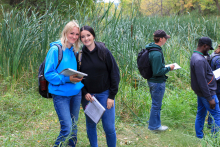Plumbing certificate to provide path to in-demand jobs for First Nations students
January 30, 2019
Dauphin location convenient for residents of nearby communities
Fifteen First Nations students from in and around Dauphin begin training for a plumbing career this week.
Assiniboine Community College is offering the Applied Plumbing Installation program at the college’s Parkland Campus in Dauphin from Jan. 28 this year to March 1, 2020.
“I'm honoured to have been accepted into this program. It will give me the learning opportunity to help my community and surrounding areas,” said Courtney Shorting, a student in the program from Rolling River First Nation.
The curriculum for the program is accredited by Apprenticeship Manitoba to provide credit for Level 1 plumbing apprenticeship in-school technical training. Graduates will receive a certificate and be eligible for the next steps of apprenticeship.
Those that entered the program without a high school diploma will earn credits towards their high school graduation and will graduate with the Plumbing program certificate and a Mature Student High School diploma.
All students will be sponsored for their tuition fees and other course costs.
The college’s Parkland campus in Dauphin is less than 100 miles (160 km) from many First Nations communities. Skownan, Waywayseecappo, O-Chi-Chak-Ko-Sipi, Ebb and Flow, Tootinaowaaziibeeng, Pine Creek, Rolling River and Keeseekoowenin First Nations have all expressed support for the program.
Delivering the program close to their home communities increases the likelihood of academic success, First Nations spokespersons said.
“The design of this program meets the needs of First Nations learners. We know that with Assiniboine Community College in Dauphin, our students will be more successful since they do not have to move to a larger urban centre, said Sheena Houle, post-secondary counsellor of the Ebb and Flow First Nation Education Authority.
Program staff will include:
- Instructors: Certified teachers for the academic preparation and a certified Red Seal plumber for the trades instruction;
- A job coach, to help students find community and college resources to succeed in the program and to help graduates transition to the workforce;
- An education assistant, to support students in studying and completing assignments; and
- Elders and Knowledge Keepers, to provide motivation and support to individual students.
The Elders and Knowledge Keepers will be part of the Indigenous cultural content that will be infused into the curriculum and program delivery, through consultation with the partner communities.
“Participants need and deserve a program that reflects their culture, acknowledges Indigenous history and that is made more relevant to them through a program and curriculum that is customized to include these features,” said Lorraine Johnson, the college’s chairperson of contract training.
Partners in the program include:
- Indigenous Services Canada, Post-Secondary Partnership Program;
- First Peoples Development Inc.; and
- Aboriginal Skills and Employment Training Strategy (ASETS) and the Education Departments (Post-Secondary) from partnering First Nations communities.
“This program will greatly enhance local capacity for Indigenous learners to gain sustainable employment in the plumbing industry. We are also confident this program will benefit the individual participants and the First Nations communities,” said Julie Parenteau, program officer for First Peoples Development Inc.
“FPDI is very supportive of Assiniboine Community College in their endeavour to create an inclusive learning environment for Indigenous students through a proven, community-based model.”
The program will use one of the three “trades-in-a-box” trailers containing all the tools needed to learn a trade – in this case, plumbing.
The three trailers were made possible through $150,000 in funding from Western Economic Diversification (WD), the federal government’s regional economic development agency. This funding covered 50 per cent of the total cost for the project, with the remaining 50 per cent paid for by the college.
Employment prospects for the program’s graduates are bright.
According to Karen Roe, executive director of the Construction Association of Rural Manitoba, “This initiative is timely and critical for the industry and Indigenous people of the region, since we are experiencing a shortage of skilled trades workers and definitely an under-representation of Indigenous people in the skilled trades.”
All of the First Nations communities involved in this training initiative require plumbers to install the plumbing and mechanical systems in new homes and other community buildings, and to provide for maintenance and repair in all buildings. Currently, these communities are contracting this work out to outside contractors. This money can remain in the community when local people have been trained.
Waywayseecappo Chief Murray Clearsky said, “In the past five years, the First Nation has constructed 40 new homes and this trend is expected to continue. Forty homes have had major repairs, and there are upcoming building and/or renovation projects for the community hall, bingo hall, an extension to the day care centre, food mart building renovations and a new gas bar and convenience store.”
This past academic year, Assiniboine has offered programming in more than two dozen communities across Manitoba, including Residential Framing in Sioux Valley Dakota Nation and Applied Building Construction in Waywayseecappo First Nation.



